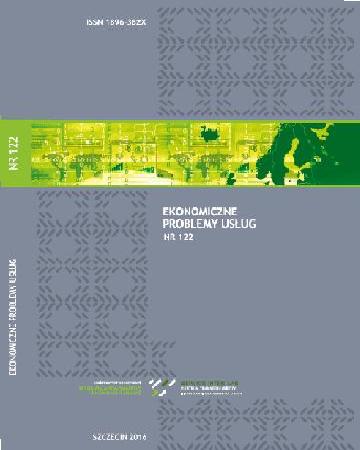
ISSN: 1896-382X
eISSN: 2353-2866
OAI
DOI: 10.18276/epu.2017.126/1-14



Issue archive /
nr 126 (1) 2017
Ekonomiki wokół gospodarki cyfrowej
(Development of economics around the digital economy)
| Authors: |
Bohdan
Jung
Szkoła Główna Hand Iowa Instytut Informatyki i Gospodarki Cyfrowej |
| Keywords: | attention economy wikinomics sharing economy reputation economy gig economy gift economy experience economy economy of access digital economy |
| Data publikacji całości: | 2017 |
| Page range: | 14 (127-140) |
| Klasyfikacja JEL: | A12 |
Abstract
This paper takes into account the proliferation of specific economics attempting to account for complex phenomena unchained by development of the digital economy. While their list is not exhaustive, the article's focus is on the following: economics of sharing, wikinomics, attention economy, economy of access, experience economy, gift economy, reputation economy, gig economy, creative economy, relationship economy, trust economy. These are analyzed from the following perspectives/building blocks of the emerging digital economy: new types of work and labour market insertion, openness, cooperation and trust, prosumption and commitment, legal perspectives of remix and gifting. Finally, a point is raised whether this is still economics as these approaches borrow heavily from social psychology, sociology and cultural anthropology.
Download file
Article file
Bibliography
| 1. | Allen, S., Deragon, J.T., Orem, M.G. Smith, C.F. (2008). The Emergence of The Relationship Economy. The New Order o/Things to Come. Silicon Valley: LLC. |
| 2. | Anderson, C. (2006). The Long Tail. Why the future of Business is Selling Less of More. New York: Hyperion. |
| 3. | Ang I. (1996). Living Room Wars: Rethinking Media Audiences. Oxon: Routledge. |
| 4. | Benkler Y. (2006). The Wealth of Networks. How Social Production Transforms Markets and Freedom. New Haven-London: Yale University Press. |
| 5. | Boyle J. (2008). The Public Domain. Enclosing the Commons of the Mind. New Haven-London: |
| 6. | Yale University Press. |
| 7. | Botsman, R., Rogers, R. (2011). WhatfJMine Is Yours. The Rise of Collaborative Consumption. |
| 8. | London: Harper Collins Publishers. |
| 9. | Botsman, R. (1988). Welcome to the new reputation economy. Wired Magazine, September. Cheal D. (1988). The Gift Economy. London: Routledge. |
| 10. | Csikszentmihalyi, M. (2008). Flow: The Psychology of Optimal Experience. New York: Harper Perennial Modem Classics. |
| 11. | Davenport, T., Beck, J. (2011). The Attention Economy: Understanding the New Currency of Business. Harvard University Press, Accenture. |
| 12. | Florida, R. (2005). The Flight of the Creative Class. The New Global Competition for Talent. |
| 13. | New York: Harper Business/Harper-Collins Publishers. |
| 14. | Grzelońska, U. (2016). Ekonomiczna Strona Kultury. Warszawa: Instytut Nauk Ekonomicznych PAN. |
| 15. | Howkins, J. (2002). The Creative Economy. How People Make Money from Ideas. London: Pen¬guin Books. |
| 16. | Independent Work: Choice, Necessity, And The Gig Economy (2016). Mc Kinsey Global Institute. |
| 17. | Pobrano z: http://www.mckinsey.com/global-themes/employment-and-growth/indepen dent-work-choice-necessity-and-the-gig-economy. |
| 18. | Jung, B. (2016)._Pełna cyfryzacja sektora gospodarki i jej możliwe konsekwencje - przykład mediów. Zeszyty Naukowe Uniwersytetu Szczecińskiego. Ekonomiczne Problemy Usług, !22, 43-58. |
| 19. | Keen, A. (2007). Cult of the Amateur: How Today's Internet is Killing Our Culture. New York: |
| 20. | Doubleday. |
| 21. | Lanham, R. (2007). The Economics of Attention: Style and Substance in the Age of Information. |
| 22. | Chicago: The University of Chicago Press. |
| 23. | Lessig, L. (2004). Free Culture. How Big Media Uses Technology and the Law to Lock Down Culture and Control Creativity. The Penguin Press. |
| 24. | Mauss, M. (2001). Socjologia i antropologia: Szkic o darze. Forma i podstawa wymiany w społeczeństwach archaicznych. Warszawa: Wydawnictwo KR. |
| 25. | Pine, J., Gillmore, J. (1999). The Experience Economy. Work Is Theatre & Every Business a Stage. Boston: Harvard University Press. |
| 26. | Rifkin, J. (2014). The Zero Marginal Cost Society. The Internet Of Things, The Collaborative Commons, And The Eclipse O/Capitalism. New York: Palgrave Macmillan. |
| 27. | Rifkin, J. (2001). The Age of Access: The New Culture of Hypercapitalism, Where all of Life is a Paid-For Experience. New York: Penguin Putnam. |
| 28. | Scholz, T. (red.) (2013). Digital Labor. The Internet as Playground and Factory. New York: |
| 29. | Routledge. |
| 30. | Shy, O. (2001). The Economics o/Network Industries. Cambridge: Cambridge University Press. Stebbins, R. (2014). Careers In Serious Leisure. From Dabbler to Devotee in Search of Fuljill¬ment. Basingstoke: Palgrave Macmillan. |
| 31. | Tapscott, D., Williams, A. (2006). Wikinomics. How Mass Collaboration Changes Everything. |
| 32. | New York: Portfolio, Penguin Group. |
| 33. | The New Digital Economy. How it will transform business, research paper produced in collabora¬tion with AT&T, Cisco, Citi, PwC & SAP, June 2011, document elektroniczny Oxford Economics. |
| 34. | Throsby, D. (2001). Economics and Culture. Cambridge: Cambridge University Press. Toffler, A. (1980). The Third Wave. New York: Bantam Books. |
| 35. | Webster, J.G. (2014). The Marketplace of Attention. How Audiences take shape una digital Age. |
| 36. | London: MIT Press Cambridge. |
| 37. | Zorska, A., Molęda-Zdziech, M., Jung, B. (2014). Kreatywność i innowacyjność w erze cyfrowej. |
| 38. | Twórcza destrukcja 2. Warszawa: Oficyna Wydawnicza SGH. |